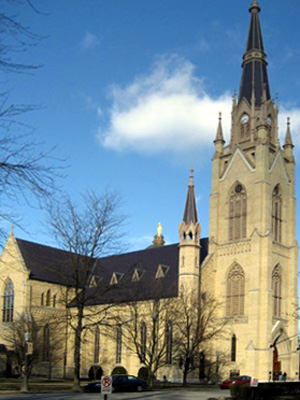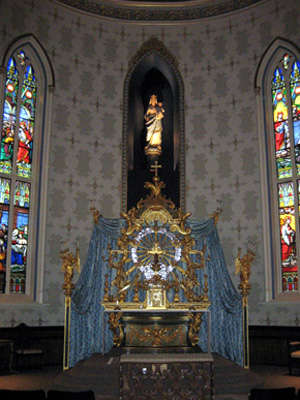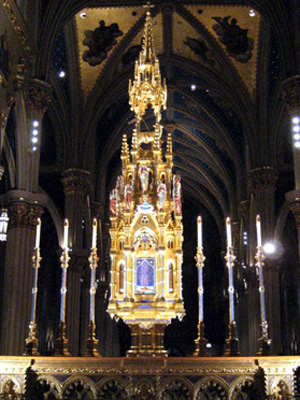| |
 |
 |
 |
| Comment on this report, or find other reports. |
 |
| Our Mystery Worshippers are volunteers who warm church pews for us around the world. If you'd like to become a Mystery Worshipper, start here. |
 |
| Find out how to reproduce this report in your church magazine or website. |
|
|
| 2342: Basilica
of the Sacred Heart, Notre Dame, Indiana, USA |
 |
 |
 |
Mystery
Worshipper: William Dewy.
The church:
Basilica of
the Sacred Heart, Notre Dame, Indiana
Denomination:
Roman Catholic,
Diocese
of Fort Wayne-South Bend.
The building:
The present building replaced the 1848 church built by Father
Edward Sorin, CSC, founder of the University of Notre Dame.
The neo-Gothic structure was begun in 1870 and consecrated in
1888. It was renovated in 1968 and again in 1988. The building
was elevated to basilica status in 1992 by Pope John Paul II.
The interior, while not for all tastes, is gorgeous. It has
a decidedly French feel to it, heavily laden with color and
symbolism to the brink of kitsch in spots, but itís still beautiful.
The high altar, from France, made a stop at the 1876 Centennial
Exposition in Philadelphia en route to Indiana, winning an award
for its design. Above the high altar rests an enormous ornate
twelve-sided tabernacle representing Jerusalem, crowned with
the Lamb of God bearing the Cross. The baroque Lady altar is
late 17th/early 18th century, the work of the Bernini studios
in Rome, one of only nine that exist; its tabernacle door contains
a relic of the table on which St Peter is said to have celebrated
the eucharist in Rome. The stained glass consists of over 1200
panels in 116 windows and is from LeMans, France.
The church:
The basilica is the church on campus of the University of Notre
Dame. As such, they get many visitors from alumni associations,
parents of students, sightseers and other pilgrims. The staff,
comprised of volunteers and students, are welcoming and friendly,
but I was just one of a parade of worshiping tourists. The parish
of the Sacred Heart has a
separate website and its own schedule. Parish liturgies
are held in the crypt of the basilica.
The neighborhood:
The unincorporated community of Notre Dame sits astride two
townships and includes the campuses of three colleges: the University
of Notre Dame, St Mary's College, and Holy Cross College, as
well as the headquarters of three religious communities: Sisters
of the Holy Cross, the Midwest Province of Brothers of the Holy
Cross, and the Indiana Province of Priests of the Holy Cross.
As an unincorporated community, Notre Dame has no government.
There is a post office, but police and fire protection are provided
by the various colleges themselves. A one-seventh size replica
of the shrine at Lourdes, where the Blessed Virgin Mary appeared
to Bernadette, is around the corner from the basilica. The Rosary
is recited daily in the grotto.
The cast:
The Revd Michael B. Wurtz, CSC, was celebrant and preacher.
The date & time:
Saturday, February 18, 2012, 5.00pm.
What was the name of the service?
Saturday Vigil Mass.
How full was the building?
It was comfortably filled without being crowded. I estimate 350 people were present.
Did anyone welcome you personally?
An usher told me "Good afternoon" as he handed me
a bulletin some 20 minutes before the start of the service.
Was your pew comfortable?
The wooden pew was comfortable and the padded kneeler was quite comfortable for kneeling.
How would you describe the pre-service
atmosphere?
Several people were quietly milling about. Some hushed whispers, but no talking. There were signs at each entrance telling the faithful to behave themselves: that men were to remove their hats, and that shoes were to be worn, no food or beverage was to be brought into the space, and to remember that you were in a holy place.
What were the exact opening words of the
service?
"Good afternoon and welcome to all our visitors."
What books did the congregation use during the
service?
We used the service leaflet, which included two hymns and the
mass setting complete with musical notation. The congregation
also relied rather heavily on a card titled Congregation
Responses for Mass found in the pews. Various editions
of the Gather hymnal were in the pews but were not
used.
What musical instruments were played?
The organ, which was located in a balcony in the liturgical west end of the nave.
Did anything distract
you?
A few children behind me whispered incessantly. It wasnít terribly
disruptive, but it was certainly distracting.

Was the worship stiff-upper-lip,
happy clappy, or what?
Standard mass with cross and candles. No incense, no bells inside,
but some bell ringing outside. The basilica has a 23-bell carillon
dating from 1852, said to be the oldest carillon in the USA.
They made the opening announcements difficult to understand.
Exactly how long was the sermon?
8 minutes.
On a scale of 1-10, how good was the preacher?
8 – Father Wurtz had a fine speaking voice and a good speed
in his delivery. I heard every word clearly.
In a nutshell, what was the sermon
about?
The sermon was about the gospel lesson of the paralytic being
brought to Jesus. Father speculated on the motives of the four
who brought the man and lowered him through the roof. We arenít
told in the text if they were family, friends, or strangers,
or if they were simply opportunists trying to get close to this
popular teacher themselves. The theme of the sermon was that
the good news had everything to do with an encounter with this
Jesus, the Christ.
Which part of the service was like being in
heaven?
The space, bright with daylight through the stained glass, filled
with mostly attentive cheerful worshipers, who acted like they
wanted to be there.
And which part was like
being in... er... the other place?
The cantor and readers were distressingly slow. I wonder if
they were coached to speak slowly so as to be understood in
the vast, acoustically live space. The cantor had a lovely voice
that was quite nice when she was singing alone, but she didn't
know how to pace the congregation – we (and she) got slower
and slower. I felt like we were marching through honey. The
intercessory prayers, too, were a lumbering call and response.
What happened when you
hung around after the service looking lost?
We and several other pilgrim/tourists explored the several side altars. There were some smiles and nods, but no other interaction.
How would you describe the after-service
coffee?
None was offered.
How would you feel about making this church your regular (where 10 = ecstatic, 0 = terminal)?
3 – If I were attached to the university community, or
the Society of the Holy Cross, I might sense greater community.
But I inferred that most everyone there was an anonymous visitor.
If I were really a resident of the neighborhood, I would certainly
consider visiting the Sacred Heart parish in the crypt of the
basilica.
Did the service make you
feel glad to be a Christian?
Oh, yes.

What one thing will you
remember about all this in seven days' time?
The massive main altar and its tabernacle in the midst of the
church. |
|
|
 |
 |
 |
| We rely on voluntary donations to stay online. If you're a regular visitor to Ship of Fools, please consider supporting us. |
 |
 |
 |
| The Mystery Pilgrim |
 |
| One of our most seasoned reporters makes the Camino pilgrimage to Santiago de Compostela in Spain. Read here. |
 |
 |
 |
| London churches |
 |
| Read reports from 70 London churches, visited by a small army of Mystery Worshippers on one single Sunday. Read here. |
| |
|
|
|
|


